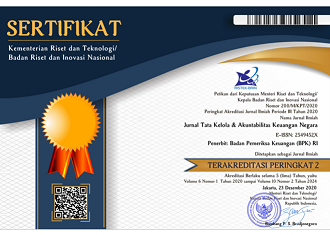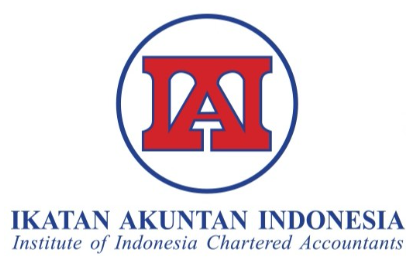Fiscal Decentralization: Is There a Simultaneous Relationship Between Regional Independence and Social Welfare?
DOI:
https://doi.org/10.28986/jtaken.v2i1.848Keywords:
Fiscal decentralization, Special Allocation Funds, regional financial independence, social welfareAbstract
Indonesia's fiscal decentralization initiative aims for two essential goals to strengthen regional financial independence and social welfare. However, intergovernmental transfers could also reduce the urgency of local governments to increase their financial independence. This study is designed to prove whether intergovernmental transfers can improve regional financial independence and social welfare. Based on a statistical test of 500 districts/cities throughout 2017—2019 using multiple linear regression analysis, more than 90% of districts/cities have yet to achieve independent financial status. In addition, regional welfare in the country is still experiencing inequality. This study's result shows Revenue Sharing Fund (Dana Bagi Hasil, DBH), General Allocation Fund (Dana Alokasi Umum, DAU), and the previous year's Physical and Non-Physical Special Allocation Funds have a significant and positive effect on regional financial independence. However, only General Allocation Funds and Non-Physical Special Allocation Funds significantly and positively affect social welfare. Whereas Revenue Sharing Fund has an insignificant and negative effect, Physical Special Allocation Funds have a significant and negative effect on social welfare. Lastly, regional financial independence has a significant positive effect on social welfare.
References
Andriana, N. (2020). Pengaruh dana perimbangan dan belanja modal terhadap kemandirian daerah. Jurnal Pajak dan Keuangan Negara, 2(1), 105–113.
BPK RI. (2020). Laporan Hasil Pemeriksaan atas Laporan Keuangan Pemerintah Pusat Tahun 2019: Laporan Hasil Reviu atas Kemandirian Fiskal Pemerintah Daerah Tahun Anggaran 2018 dan 2019. Jakarta: BPK RI.
BPK RI. (2021). Laporan Hasil Pemeriksaan atas Laporan Keuangan Pemerintah Pusat Tahun 2020: Laporan Hasil Reviu atas Kemandirian Fiskal Pemerintah Daerah Tahun 2020. Retrieved from https://www.bpk.go.id/assets/files/lkpp/2020/lkpp_2020_1624341245.pdf
BPS. (2021a). Indeks pembangunan manusia 2020. Retrieved from https://www.bps.go.id/publication/2021/04/30/8e777ce2d7570ced44197a37/indeks-pembangunan-manusia-2020.html
BPS. (2021b). Statistik keuangan pemerintah kabupaten/kota tahun 2019-2020. Jakarta: Badan Pusat Statistik.
Ejobowah, J. B. (2018). The second-generation theory of fiscal federalism: A critical evaluation. Perspectives on Federalism, 10(1), 222–245. DOI: 10.2478/pof-2018-0011
Ewetan, O. O., Matthew, O. A., Babajide, A. A., Osabohien, R., & Urhie, E. (2020). Fiscal federalism and economic development in Nigeria: An auto-regressive distributed lag approach. Cogent Social Sciences, 6(1). DOI: 10.1080/23311886.2020.1789370
Fatimah, A. N., & Priyono, N. (2020). Kontribusi PAD, dana perimbangan, belanja daerah terhadap kesejahteraan masyarakat di Jawa Tengah. JAAF (Journal of Applied Accounting and Finance), 4(2), 75–92.
Ghuman, B. S., & Singh, R. (2013). Decentralization and delivery of public services in Asia. Policy and Society, 32(1), 7–21. DOI: 10.1016/j.polsoc.2013.02.001
Ginting, A. M., Hamzah, M. Z., & Sofilda, E. (2019). Pengaruh dana perimbangan terhadap kemandirian keuangan daerah. Indonesian Treasury Review Jurnal Perbendaharaan Keuangan Negara dan Kebijakan Publik, 4(2), 105–127. DOI: 10.33105/itrev.v4i2.126
Gomes, R. C., Alfinito, S., & Albuquerque, P. H. M. (2013). Analyzing local government financial performance: evidence from Brazilian municipalities 2005-2008. Revista de Administração Contemporânea, 17(6), 704–719. DOI: 10.1590/s1415-65552013000600005
Gousario, F., & Dharmastuti, C. F. (2015). Regional financial performance and human development index based on study in 20 counties/cities of level I region. The Winners, 16(2), 152. DOI: 10.21512/tw.v16i2.1568
Gujarati, D. N., & Porter, D. C. (2009). Basics Econometrics (5th ed.). New York: Douglas Reiner.
Ikasari, P. (2015). Pengaruh dana alokasi umum, dana alokasi khusus, dan belanja modal terhadap tingkat kemandirian keuangan daerah (Studi kasus pada kabupaten/kota di DIY periode 2007-2014) [Universitas PGRI Yogyakarta]. Retrieved from http://repository.upy.ac.id/234/1/ARTIKEL SKRIPSI PUTRI.pdf
Jayabuana, N. (2016, August 16). Mendorong kemandirian daerah. Media Indonesia. Retrieved from https://mediaindonesia.com/ekonomi/61862/mendorong-kemandirian-daerah
Jha, P. C. (2012). Theory of fiscal federalism: An analysis. Munich Personal RePEc Archive, 41769, 1–33. Retrieved from https://mpra.ub.uni-muenchen.de/41769/
Kementerian Pendidikan dan Kebudayaan. (2019). Pemanfaatan Dana Alokasi Khusus Fisik Bidang Pendidikan (Pertama). Jakarta: Pusat Penelitian Kebijakan Pendidikan dan Kebudayaan, Badan Penelitian dan Pengembangan, Kementerian Pendidikan dan Kebudayaan.
Kim, E., & Samudro, Y. N. (2017). The impact of intergovernmental transfer funds on interregional income disparity in Indonesia. International Journal of Urban Sciences, 21(1), 22–40. DOI: 10.1080/12265934.2016.1240626
Liu, Y., Martinez-Vazquez, J., & Wu, A. M. (2017). Fiscal decentralization, equalization, and intra-provincial inequality in China. International Tax and Public Finance, 24(2), 248–281. DOI: 10.1007/s10797-016-9416-1
Martinez-Vazquez, J., Lago-Peñas, S., & Sacchi, A. (2017). the Impact of Fiscal Decentralization: a Survey. Journal of Economic Surveys, 31(4), 1095–1129. DOI: 10.1111/joes.12182
Masaki, T. (2018). The impact of intergovernmental transfers on local revenue generation in Sub-Saharan Africa: Evidence from Tanzania. World Development, 106, 173–186. DOI: 10.1016/j.worlddev.2018.01.026
Massardi, W. de O., & Abrantes, L. A. (2015). Esforço fiscal, dependência do fpm e desenvolvimento socioeconômico: Um estudo aplicado aos municípios De Minas Gerais. Revista de Gestão, 22(3), 295–313. DOI: 10.5700/rege564
Mendes, W. de A., Ferreira, M. A. M., Abrantes, L. A., & deFaria, E. R. (2018). The influence of economic capacity and the formation of public revenues on human development. Revista de Administracao Publica, 52(5), 918–934. DOI: 10.1590/0034-761220170004
Mogues, T., & Benin, S. (2012). Do external grants to district governments discourage own revenue generation? A look at local public finance dynamics in Ghana. World Development, 40(5), 1054–1067. DOI: 10.1016/j.worlddev.2011.12.001
Noor, M. (2012). Memahami desentralisasi Indonesia. Yogyakarta: Interpena.
Rahmayati, A., & Pertiwi, I. F. (2018). Pengaruh pendapatan asli daerah dan dana perimbangan terhadap indeks pembangunan manusia. Journal of Islamic Finance and Accounting, 1(1). DOI: 10.22515/jifa.v1i1.1149
Rosen, H. S. (1988). Fiscal federalism: Quantitative studies. Gramlich 1987, 151–154. DOI: 10.7208/chicago/9780226726236. 001.0001
Sarkoro, H., & Zulfikar, Z. (2016). Dana alokasi khusus dan pendapatan asli daerah terhadap indeks pembangunan manusia (studi empiris pada Pemerintah Provinsi se-Indonesia tahun 2012-2014). Riset Akuntansi dan Keuangan Indonesia, 1(1), 54–63. DOI: 10.23917/reaksi.v1i1.1972
Siburian, M. E. (2019). Fiscal decentralization and regional income inequality: evidence from Indonesia. Applied Economics Letters, 27(17), 1383-1386. DOI: 10.1080/13504851.2019.1683139
Slavinskaite, N. (2017). Fiscal decentralization and economic theory. Review of Business and Legal Sciences, 26, 86–98. DOI: 10.26537/rebules.v0i26.1005
Sulaeman, A. S., & Andriyanto, N. (2021). Optimalisasi pengelolaan dana alokasi khusus (DAK) untuk mendorong pertumbuhan pembangunan daerah di Indonesia. Jurnal Akuntansi Aktual, 5(2), 175–200.
Sulaeman, A. S., & Silvia, V. (2019). Pendapatan asli daerah,transfer daerah, dan belanja modal, pengaruhnya terhadap pertumbuhan ekonomi regional di Indonesia. Jurnal Aplikasi Akuntansi, 4(1), 97–112. DOI: 10.29303/jaa.v4i1.61
UNDP. (2019). Human Development Report 2019. Retrieved from https://hdr.undp.org/content/human-development-report-2019
Yushkov, A. (2016). Fiscal decentralization and regional economic growth: Theory, empirical studies, and Russian experience. Voprosy Ekonomiki, 2(2016), 94–110. DOI: 10.32609/0042-8736-2016-2-94-110
Downloads
Submitted
Accepted
Published
How to Cite
Issue
Section
License

Jurnal Tata Kelola dan Akuntabilitas Keuangan Negara is licensed under
a Creative Commons Attribution-ShareAlike 4.0 International License




















